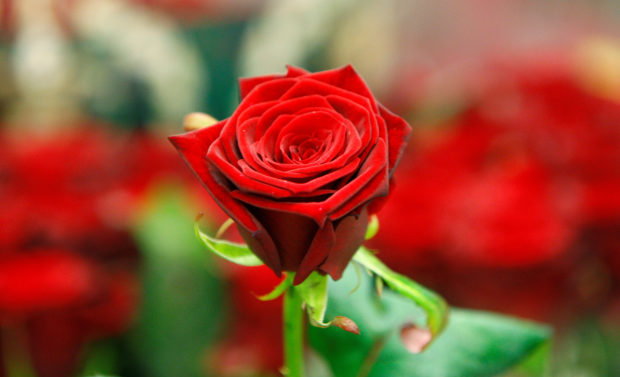
A red rose is displayed on a stall at New Covent Garden Market, a day before Valentine’s Day, London. REUTERS/Andrew Parsons (BRITAIN)/File photo
LONDON – This Valentine’s Day is set to look different after a year of record food inflation that has sent up prices of everything from flowers to chocolates and dining in restaurants.
COVID-era supply chain logjams and Russia’s invasion of Ukraine have meant that Britons paid a record 16.7 percent more for food in the four weeks to Jan. 22 compared to the same period last year, according to research firm Kantar.
As a result, romantic Valentine dinners out will cost more and restaurants are modifying their offerings to attract cash-conscious customers.
Last year, British restaurant chain PizzaExpress offered a three-course set menu complete with “a prosecco and raspberry mimosa, heart-shaped dough balls and a main, such as our Padana, with creamy goat’s cheese and sweet caramelised onion”. Priced at 23.95 pounds ($29) per person, the ad for the meal asked: “Will the Triple Salted Caramel Cheesecake tickle your fancy?” This year, PizzaExpress is advertising a slightly less impressive “love bundle” of a starter and a “classic” pizza for 15 pounds.
According to the latest data from Britain’s Office of National Statistics, eating at restaurants in December cost 9.4% more than last year.
Other expenses associated with date nights – from flowers and cinema tickets to taxis and childcare – also rose. As companies such as Mondelez, Nestle and Lindt hiked prices, people paid 10.7 percent more for chocolates.
The nation’s supermarkets are seeking to cash in, keeping prices for their Valentine’s Day meal-deals stable in the hope of luring customers from restaurants.
Morrisons is selling a 15-pound package for a starter, main, two sides, drink and dessert. Its members will get 1 pound off a dozen fresh red roses from Feb. 11, the retailer said. The price of flowers rose 6.2 percent in Britain in December.
Tesco, whose CEO recently noted that consumers are shifting away from eating out, has reduced the price of its Valentine’s Day dinner-for-two to 12 pounds – down from 15 pounds last year – for a main, side dish, dessert and drink.
Sainsbury’s has tied up with Uber Eats to offer 15 pound “emergency bundles” of a three-course meal, drinks and gifts with free delivery in parts of East London.
“It’s an opportunity for the supermarkets to sell their premium ranges to people who wouldn’t normally buy them,” said Chris Beckett, head of equity research at investment firm Quilter Cheviot. “That could lead to repeat purchases in the future.”
Even diners with deeper pockets will have to dish out more this year.
London’s Michelin-starred Ritz Restaurant, whose ad boasts “breathtaking” interiors “with spectacular garland chandeliers and romantic twinkling candlelight all reflected in the mirrored panels”, this year priced its four-course set Valentine’s menu at 395 pounds per person, up from 325 pounds last year.
Both years, the deal included a glass of Barons de Rothschild “Ritz Reserve” Rosé NV Champagne and a menu created by the Ritz’s Executive Chef John Williams, Member of the Order of the British Empire.
Elsewhere in Europe, a similar trend has taken hold.
Luxury hotel Le Bristol in Paris, for instance, is this year charging upwards of 2,190 euros ($2,338) for its “seductive offer” that includes a room for one night, late check-out, a “gastronomic dinner for two”, chocolate and a bottle of champagne. Last year, a similar experience cost 1,090 euros.
The Ritz and Le Bristol did not respond to a request for comment.

